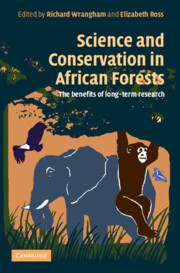Book contents
- Frontmatter
- Contents
- List of contributors
- Foreword
- Preface
- Acknowledgments
- 1 Why the link between long-term research and conservation is a case worth making
- 2 Links between research and Protected Area management in Uganda
- 3 The use of research: how science in Uganda's National Parks has been applied
- 4 Long-term research and conservation in Kibale National Park
- 5 Monitoring forest–savannah dynamics in Kibale National Park with satellite imagery (1989–2003): implications for the management of wildlife habitat
- 6 Long-term studies reveal the conservation potential for integrating habitat restoration and animal nutrition
- 7 Long-term perspectives on forest conservation: lessons from research in Kibale National Park
- 8 Health and disease in the people, primates, and domestic animals of Kibale National Park: implications for conservation
- 9 The importance of training national and international scientists for conservation research
- 10 Community benefits from long-term research programs: a case study from Kibale National Park, Uganda
- 11 Potential interactions of research with the development and management of ecotourism
- 12 The human landscape around the Island Park: impacts and responses to Kibale National Park
- 13 Conservation and research in the Budongo Forest Reserve, Masindi District, Western Uganda
- 14 Long-term research and conservation in Gombe National Park, Tanzania
- 15 Long-term research and conservation in the Mahale Mountains, Tanzania
- 16 The contribution of long-term research by the Taï Chimpanzee Project to conservation
- 17 The Green Corridor Project: long-term research and conservation in Bossou, Guinea
- 18 Long-term research and conservation of the Virunga mountain gorillas
- 19 Long-term research and conservation of great apes: a global future
- 20 Long-term research and conservation: the way forward
- Index
- References
9 - The importance of training national and international scientists for conservation research
Published online by Cambridge University Press: 06 July 2010
- Frontmatter
- Contents
- List of contributors
- Foreword
- Preface
- Acknowledgments
- 1 Why the link between long-term research and conservation is a case worth making
- 2 Links between research and Protected Area management in Uganda
- 3 The use of research: how science in Uganda's National Parks has been applied
- 4 Long-term research and conservation in Kibale National Park
- 5 Monitoring forest–savannah dynamics in Kibale National Park with satellite imagery (1989–2003): implications for the management of wildlife habitat
- 6 Long-term studies reveal the conservation potential for integrating habitat restoration and animal nutrition
- 7 Long-term perspectives on forest conservation: lessons from research in Kibale National Park
- 8 Health and disease in the people, primates, and domestic animals of Kibale National Park: implications for conservation
- 9 The importance of training national and international scientists for conservation research
- 10 Community benefits from long-term research programs: a case study from Kibale National Park, Uganda
- 11 Potential interactions of research with the development and management of ecotourism
- 12 The human landscape around the Island Park: impacts and responses to Kibale National Park
- 13 Conservation and research in the Budongo Forest Reserve, Masindi District, Western Uganda
- 14 Long-term research and conservation in Gombe National Park, Tanzania
- 15 Long-term research and conservation in the Mahale Mountains, Tanzania
- 16 The contribution of long-term research by the Taï Chimpanzee Project to conservation
- 17 The Green Corridor Project: long-term research and conservation in Bossou, Guinea
- 18 Long-term research and conservation of the Virunga mountain gorillas
- 19 Long-term research and conservation of great apes: a global future
- 20 Long-term research and conservation: the way forward
- Index
- References
Summary
Conservation of biological diversity depends upon a critical mass of dedicated, well-trained people. Developing countries such as Uganda require a cadre of nationals who can work at all levels from policy to science so that their respective country's conservation challenges can be met. Long-term research and training programs can play an important role in creating such a cadre as well as forging international links that bring in extra expertise and resources. Their success is best measured by how many nationals become research leaders and how many become effective mentors and trainers.
The International Union for the Conservation of Nature's World Conservation Strategy recognized in 1980 the need for training conservation leaders in tropical countries. This is reiterated in the Convention on Biological Diversity (1992), with Article 12 specifically highlighting the need for research training in developing countries. Nevertheless, nationals from developing countries still perceive a need for more training in a range of topics including conservation biology, monitoring and evaluation, fundraising, and project design (Bonine et al.,2003).
Although the tropics is host to a large number of field stations (the World Register of Field Centres lists a good majority of them), much of the well-funded research and training that is carried out in the tropics is driven by international rather than by national researchers. Long-term programs can therefore play a role in assisting tropical field stations and their collaborators meet national training and research priorities and develop conservation capacity among national scientists.
- Type
- Chapter
- Information
- Science and Conservation in African ForestsThe Benefits of Longterm Research, pp. 88 - 98Publisher: Cambridge University PressPrint publication year: 2008
References
- 4
- Cited by



